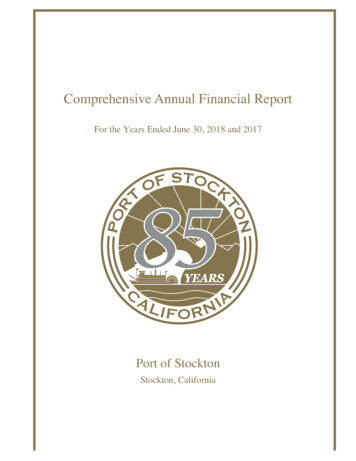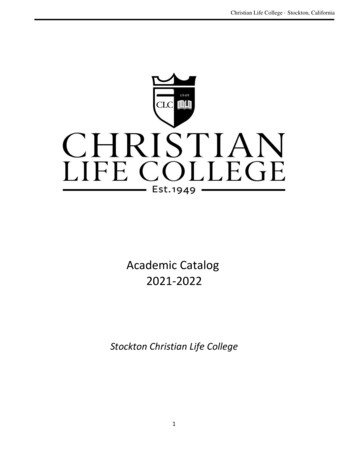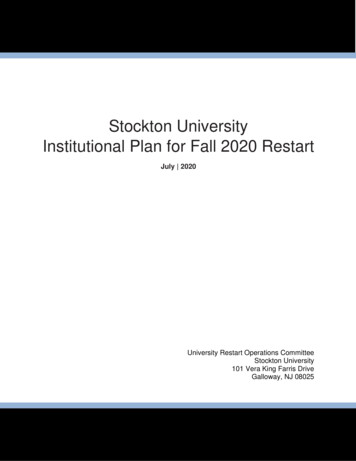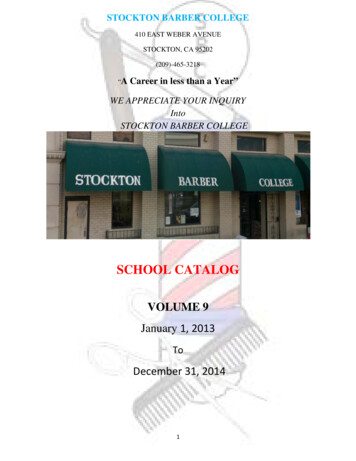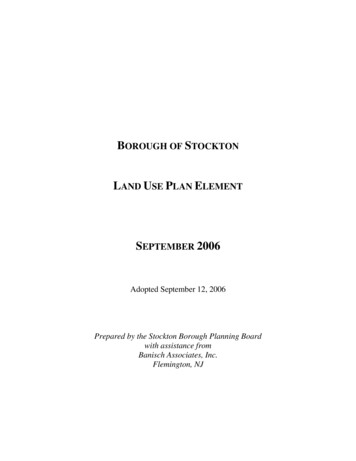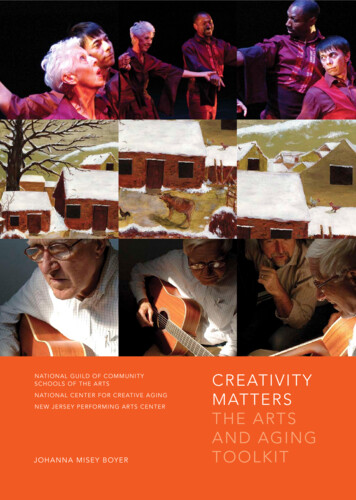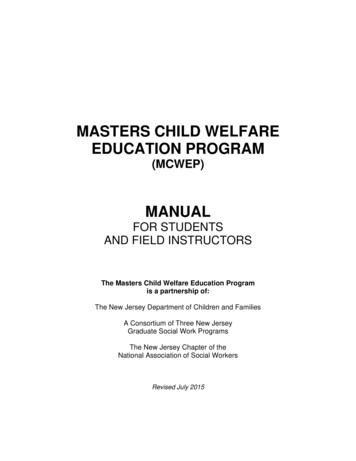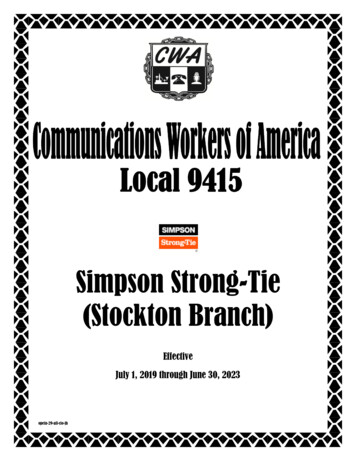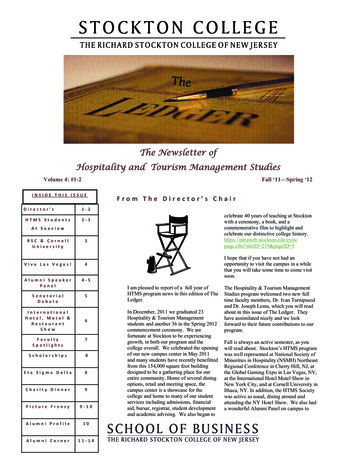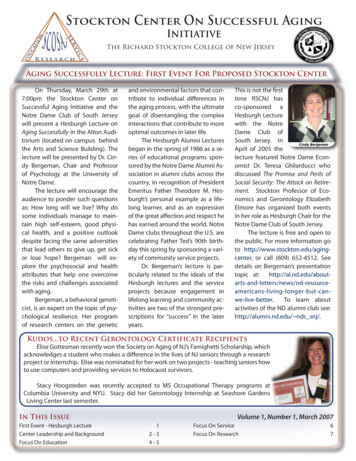
Transcription
Stockton Center On Successful AgingInitiativeThe Richard Stockton College of New JerseyAging Successfully Lecture: First Event For Proposed Stockton CenterOn Thursday, March 29th at7:00pm the Stockton Center onSuccessful Aging Initiative and theNotre Dame Club of South Jerseywill present a Hesburgh Lecture onAging Successfully in the Alton Auditorium (located on campus behindthe Arts and Science Building). Thelecture will be presented by Dr. Cindy Bergeman, Chair and Professorof Psychology at the University ofNotre Dame.The lecture will encourage theaudience to ponder such questionsas: How long will we live? Why dosome individuals manage to maintain high self-esteem, good physical health, and a positive outlookdespite facing the same adversitiesthat lead others to give up, get sickor lose hope? Bergeman will explore the psychosocial and healthattributes that help one overcomethe risks and challenges associatedwith aging.Bergeman, a behavioral geneticist, is an expert on the topic of psychological resilience. Her programof research centers on the geneticand environmental factors that contribute to individual differences inthe aging process, with the ultimategoal of disentangling the complexinteractions that contribute to moreoptimal outcomes in later life.The Hesburgh Alumni Lecturesbegan in the spring of 1986 as a series of educational programs sponsored by the Notre Dame Alumni Association in alumni clubs across thecountry, in recognition of PresidentEmeritus Father Theodore M. Hesburgh’s personal example as a lifelong learner, and as an expressionof the great affection and respect hehas earned around the world. NotreDame clubs throughout the U.S. arecelebrating Father Ted’s 90th birthday this spring by sponsoring a variety of community service projects.Dr. Bergeman’s lecture is particularly related to the ideals of theHesburgh lectures and the serviceprojects because engagement inlifelong learning and community activities are two of the strongest prescriptions for “success” in the lateryears.This is not the firsttime RSCNJ hasco-sponsored aHesburgh Lecturewith the NotreDame Club ofSouth Jersey. InApril of 2005 thelecture featured Notre Dame Economist Dr. Teresa Ghilarducci whodiscussed The Promise and Perils ofSocial Security: The Attack on Retirement. Stockton Professor of Economics and Gerontology ElizabethElmore has organized both eventsin her role as Hesburgh Chair for theNotre Dame Club of South Jersey.The lecture is free and open tothe public. For more information goto http://www.stockton.edu/agingcenter, or call (609) 652-4512. Seedetails on Bergeman’s presentationtopic at: .To learn aboutactivities of the ND alumni club see:http://alumni.nd.edu/ ndc snj/.Kudos.to Recent Gerontology Certificate RecipientsElise Gottesman recently won the Society on Aging of NJ’s Famighetti Scholarship, whichacknowledges a student who makes a difference in the lives of NJ seniors through a researchproject or internship. Elise was nominated for her work on two projects - teaching seniors howto use computers and providing services to Holocaust survivors.Stacy Hoogsteden was recently accepted to MS Occupational Therapy programs atColumbia University and NYU. Stacy did her Gerontology Internship at Seashore GardensLiving Center last semester.In This Issue First Event - Hesburgh Lecture Center Leadership and Background Focus On Education 12-34-5 Volume 1, Number 1, March 2007Focus On Service 6Focus On Research 7
Center Leadership and BackgroundWelcome to what we hope will be the first of many issuesof the Stockton Center on Successful Aging Newsletter. This firstissue introduces the initiatives currently underway to developa Stockton Center that will act as a catalyst for research, education, and service related to aging. We hope that the informationprovided here will encourage interested individuals to contact usand consider becoming involved in various facets of the Center.As most readers know major changes in population demographics are occurringin the U.S. and abroad. Population aging, accelerated by the aging of the baby boomgeneration (70 million strong), requires that our society change how we view aging,and what we do about it. The social and economic implications of an aging population - and of the baby boom in particular - are likely to be profound for both individuals and society, says Census Bureau Director Louis Kincannon (U.S. Dept. of Census,2005). Right at our doorstep, along Jimmie Leeds Road, there is evidence of the shifting demographics and needs as several assisted living facilities, nursing homes, andadult daycare centers have cropped up almost overnight. Further down the road inSmithville and other areas of the township there are thousands of new older adultresidents in “Active Adult” communities.The seeds for this Center initiative have been germinating for some time. Indeed,the gerontology program has over the years sponsored conferences and workshops,and partnered with community organizations. Yet, the nature of our program, having no staff with primary appointments in gerontology, has limited our capacity andresources.In recent years, both President Herman Saatkamp and Provost David Carr haverecognized the opportunity for expansion and began to encourage the developmentof a Center on Aging as Stockton strategically shifts its attention to a variety of community partnerships. The idea gained momentum with the hiring of Dean Cheryl Kaus(Social and Behavioral Science) as well as six other faculty or administrators with advanced degrees in aging.This brings us to the present – there is clear community need for action on aging,higher education can serve as a community change agent, and Stockton has historicalstrength in gerontology and a recent infusion of new experts in the field. So, the timeis right for us to enhance our efforts. In recognizing the need for action, beginningin January, Provost Carr has funded an accelerated effort – course releases for the interim director, a part-time assistant, modest expense budget, and support for facultydevelopment projects during the summer months (totaling approximately 9,000).Our goal is to produce a 5-year Center development plan based on careful strategic planning, and receive formal approval for the Center at the September Meetingof Stockton’s Board of Trustees. In recognition of tight state and institutional budgets,we have also been encouraged to produce some deliverables by the end of the summer. This newsletter is one of those “deliverables” and describes our current “Plan andProduce” strategy. We hope you enjoy!Best wishes,Dave Burdick, Ph.D.Professor of Psychology, SCOSAi DirectorAn excellent report on the aging of our population: U.S. Dept. of Census (2006). 65 in the U.S.: 2005. eleases/PR2006030965PlusReport.htm SCOSAi NewsStaff MemberAnita Beckwith is SCOSAi’snew part-time staff member,responsible for newsletterand web-site design and production, database management, and oversight of variousSCOSAi projects. Anita wasfounder and director of theHBA, a non-profit environmental educational organization;taught vocational horticultureat ACIT, where she was named“Teacher of the Year” in 2001for her work in re-developing ahorticulture program; and nowowns and operates FlorawoodsDesigns, a graphic arts andphotography business. Thanksto the Honors Center DirectorMike Hozik for providing Anitasomeplace to ‘hang her hat’until dedicated space for thecenter is located.Student AssistantsAlanna PisaniSenior Psychology Major,Galloway Township SeniorServicesLeslie LykesSenior Biology Major, SunriseAssisted Living of GallowayGina MaguireJunior Sociology & Anthropology Major, Funding SourcesRoseanne FisherSenior Psychology Major,Atlantic County Nutrition Sites
Service Initiatives - Christa Caldarale-Ahearn, ChairChrista Caldarale-Ahearn, RN, MS, received her Masters of Nursing from the Rutgers School of Nursing in 2000. She is Owner and Chief Executive Officer of Generations Adult Day Health Services, LLC inSomers Point. Generations is a regular host to Stockton interns and practicum students. Christa is an Adjunct Instructor for the Gerontology Program, teaching our “Intro” course for the past several semesters.The SCOSA Service Initiative will seek to leverage the major resources that Stockton can offer asa community partner: through our faculty expertise and service learning students from their courses;through other student initiatives, clubs, and Greek organizations; and through older adult serving as resources inSCOSAi sponsored service projects.Education Initiatives - Christine Ferri, ChairDr. Ferri, Assistant Professor of Psychology, joined the Stockton faculty in 2005 after earning herPh.D. in Clinical Psychology from Duke University and completing a Post-Doctoral Fellowship in Geropsychology at the UMDNJ School of Osteopathic Medicine. She is Co-Vice President for Education of theSociety on Aging of New Jersey, and faculty advisor to Stockton’s Chapter of the Psi Chi Honor Societyin Psychology.The Education Initiative plans to enhance learning opportunities for Stockton students, local healthcare professionals, and older adults. We are working to increase enrollment in the gerontology certificateprogram by recruiting students from introductory courses in the social and natural sciences. The gerontology curriculumwill be evaluated by an external reviewer along with student input to ensure that we are meeting the needs and interestsof those students who are earning the certificate.Continued on page Research Initiatives - Lisa Cox, ChairDr. Cox, Associate Professor, and Coordinator of Stockton’s Social Work Program received her Ph.D.in Social Work and Social Policy and a graduate Certificate in Aging Studies from Virginia Commonwealth University’s School of Social Work and School of Allied Health. Her research interests include theintersection of health issues with gerontology, spirituality, and family.A core SCOSAi principle is that basic research is the foundation for education, and that synthesis ofresearch and education is necessary to develop effective service programs. The SCOSAi research initiative will serve as a catalyst for aging research by Stockton faculty and students, and in collaboration with partners fromcommunity agencies and other universities. The research committee will also encourage publication of results from various center sponsored programs. Dr. Cox notes that her position on the College-wide Personnel Committee gives her anexcellent vantage by which to identify faculty, not currently involved in the gerontology program, who have conductedage-related research, or who have potential to do so and who might wish to affiliate with the center. In our Fall issue,Dr. Cox will further elaborate on the research objectives of the center, and we will begin to describe center-sponsored orage-related research at Stockton, as well as funding and support opportunities to encourage future research.SCOSA¡ Advisory BoardAn Advisory Board of approximately 12 members will play an integral role in planning and operating the Center.Commitments to serve on this board are currently being obtained.The following community leaders have already signed on:Howard Berger, Chair, Atlantic County Senior Citizens Advisory Board (Northfield)Beth Bozzelli, Executive Director, Cape May County Office on Aging (Rio Grande)Charles Burton, Vice President for Community Operations, Family Service Association (Hamilton Township)Christa Caldarale-Ahearn, President and CEO, Generations Adult Day Health Services (Somers Point)David Delaney, Public Affairs Specialist, Social Security Administration (Egg Harbor Township)Carla Dow, Director, Galloway Township Department of Senior and Social Services (Galloway Township)Jennie Echo, Coordinator of Senior Services, Family Service Association (Hamilton Township)John Emge, Executive Director, United Way of Atlantic County (Galloway Township)Marilu Gagnon, Director, Atlantic County Division of Intergenerational Services (Northfield)Joanne Leichte, Director of Community Outreach, Southern Ocean County Hospital (Manahawkin)SCOSAi News
Focus On EducationDr. Ferri - Continued from page Our first collaboration withStockton’s office of ProfessionalDevelopment & Continuing Ed. forHealth Sciences & Human Services(PDCE-HSHS) helps us build workingrelationships with area agencies andprofessionals, which in turn can helpus develop more internships and jobprospects for our undergraduates.We are also excited about initiating educational opportunities forolder adults living in nearby communities and health care facilities,by bringing seniors to Stockton,and by “bringing Stockton to them”.Currently, we are working with theAtlantic County Division of Intergenerational Services to developprograms at the county’s seniornutrition sites, and with Sunrise Assisted Living of Galloway on a general education program in its facilityin Pomona. We hope to extend thisprogram as a model for Sunrise facilities across the country. We haveplans for education programs ontopics related to health, health careand changes associated with aging.However, we also plan to arrange foreducational series that tap into theexpertise of Stockton faculty acrossthe college, including local history,social and cultural topics, arts andmusic and the sciences. Educationalopportunities with older adults willnot be limited to the classroom - welook forward to integrating seniorsinto community service projectsorganized by Stockton as well as establishing discussion groups beforeor after performances at the Stockton Performing Arts Center.If you have ideas, input or suggestions for the education committee, please contact me anytimeat 609-626-6040 or christine.ferri@stockton.edu. SCOSAi NewsContinuingProfessional EducationClinician’s ClassroomSpring Series CelebratingOlder Americans MonthSCOSA has organized its first offerings of continuing education forthe professional community in collaboration with Stockton’s Office ofProfessional Development and Continuing Education for Health Sciences and Human Services. The series, to run throughout the month ofMay, will consider important issuesrelated to work with older clients.Thank you to PDCE-HSHS DirectorCynthia Sosnowski and her staff fortheir support of SCOSAi development and programs.The series includes the following workshops; all run from 9am12noon at Stockton’s Carnegie Library Center in Atlantic City.For details and registration information online: http://www.stockton.edu/agingcenter or call 609.652.4959.Thursday, May 10th, Treating LateLife Depression: Rewards andChallenges, (Christine Ferri, PhD.,Stockton Assistant Professor of Psychology) Clinical depression is nota normal part of aging. However,when older adults are depressed,there are multiple barriers to accurate diagnosis and effective treatment. The workshop will include areview of distinctive characteristicsof depression in older adults andsuggest specific techniques for evaluation and treatment.Thursday, May 17th, Sexuality andAging (Elizabeth G. Calamidas, Ph.D.,Stockton Associate Professor andCoordinator of Public Health).Sexuality is an integral part of humanexistence and is continually shapedby physical, psychological, social, andcultural influences. This interactiveworkshop will address the specialchallenges facing clinicians andproviders in dealing with the sexualityof their elderly clients.Wednesday, May 23rd, Older Adultsand Substance Abuse: CurrentIssues, Future Concern (Erma PollyWilliams, MRE, Program Specialistfor the Aging, Division of AddictionServices, New Jersey Department ofHuman Services.) This presentationwill give an overview of the currentstatus of substance abuse amongolder adults including prevalence; thevarious dimensions of use and abuse;the medical, psychological and socialimpact; and the range of initiativesthat are needed to adequatelyaddress the problem. The impact ofthe aging of “baby boomers” uponsubstance abuse service systems willalso be discussed.Thursday, May 31st, Communicatingwith Older Clients: OvercomingInformation ProcessingDeficits (David C. Burdick, Ph.D.,Stockton Professor of Psychology,Coordinator of GerontologicalStudies). Understanding thesensory, perceptual, and cognitivecapacities of clients serves as a crucialfoundation for effectively workingwith seniors. The core of the sessionshall be devoted to various means ofcompensating for and overcomingpotential communication deficits sothat they do not hinder our attemptsto effectively work with older clients,patients, and co-workers.
Education For Undergraduates:There are many reasons that undergraduates from a variety of fields should consider taking one or more courses in aging, and perhaps completing the gerontology certificate. U.S. Labor Department statistics consistently show that jobsin fields related to aging will be particularly abundant for the near future as baby boomers age during the next threedecades.Stockton’s Gerontology (GERO) Supporting Study is a 20 credit interdisciplinary certificate program that involves students and faculty from across the College. Students may earn the gerontology certificate in conjunction with any major;some non-matriculated students come to Stockton just to complete the GERO certificate to enhance their job performance and/or credentials in this growing field. Since its inception, the program has granted over 500 certificates, making it the most productive undergraduate gerontology program in the state. For further information, go to http://www.stockton.edu/agingcenter.2007 Summer and Fall Gerontology Courses Offered At StocktonCourse IDSummerTitleInstructorDayTimesNotesMan. Orient: 5/151130AM-0230PMAddl Mtgs: 5/22, 6/5,6/12 1130AM-0230PMGERO 1100-191 Intro to GerontologyAaronson LGERO 2292-401 Aging and the FamilyHines-Smith STR1130AM-0230PMX: SOWK 2292-401GERO 2707-291 Aging and HealthCalamidas ETBAMan. Orient: 5/151130AM-0230PMAddl Mtgs: 7/111130AM-1245PMGERO 3616-101 Aging and Mental HealthFerri CMTWR1130AM-0230PMX: PSYC 3616-101GERO 3754-201 Research on AgingBurdick DTBAGERO 3900-201 Gerontology InternshipBurdick DTBAFallGERO 1100-001 Intro to GerontologyShambare JMW0335PM-0525PMGERO 1100-002 Intro to GerontologyCaldarale-AhearnTR0600PM-0750PMGERO 2109-001 Biology of AgingWerner RMWF1120AM-1235PMGERO 2282-001 Economics for all AgesElmore ETR0830AM-1020AMGERO 2381-001 Adult Development and AgingBurdick DTR1230PM-0220PMGERO 2620-001 Therapeutic Art for EldersCallanan BTR0230PM-0420PMGERO 2792-001 Aging and the FamilyJaynes WT0430PM-0550PMGERO 3220-001 Aging and SpiritualityBatten DTR1030AM-1220PMX: SOWK 3220-001GERO 3616-001 Aging and Mental HealthFerri CMWF0830AM-0945AMX: PSYC 3616-001GERO 3754-001 Research on AgingBurdick DTBAGERO 3760-001 Funding in AgingBurdick DTBAGERO 3900-001 Gero InternshipBurdick DTBAX: PSYC 2381-001For Professionals: Library & Media ResourcesStockton’s library maintains anextensive collection of books,periodicals, and media holdingsrelated to the study of aging.Professionals and other serviceproviders are welcome to come in touse the library, and can also receivea library account in order to checkout materials, and acquire materialsonline via the library web-site. Thelibrary’s helpful staff can assist youin finding materials on subjectsof interest. In addition, membersof SCOSAi’s leadership team canprovide suggestions. If you have amore extensive project and withenough advanced notice, studentresearch assistance can be arrangedthrough SCOSAi. Information on thelibrary can be obtained online under“Online Resources” at www.stockton.edu or by calling (609) 652-4346.SCOSAi News
Focus On ServiceSCOSAi’s Growing Portfolio of CollaborationsASMemorandum of Understanding was recentlycompleted by Stockton and the Society on Aging ofNew Jersey (SANJ). Since 1972, SANJ has been a statewide,multidisciplinary organization, dedicated to providing thehighest quality training and education for professionalsserving the older adult community. (www.sanjonline.org).The agreement builds upon over 20 years of cooperation, which has included co-sponsorship of conferencesand workshops, collaborative grant writing and management, participation in SANJ leadership by various Stockton faculty and staff, and student/alumni involvement invarious SANJ activities.SANJ and Stockton will seek to strengthen collaborations in ways that are of mutual benefit to both organizations, and which improve programs and services forNew Jersey’s growing older adult population and theirfamilies. It also seeks to stimulate and encourage multiple means of involving SANJ members in various activitiessponsored by Stockton as well as Stockton student andfaculty involvement in various SANJ activities, conferences and research projects.In conjunction with this agreement the SANJmembership recently elected Stockton ProfessorsChristine Ferri and David Burdick as Co-Vice Presidents forEducation. The position entails planning and implementingvarious SANJ educational activities including the AnnualConference and periodic Ed-Net meetings around thestate. Burdick has played several roles for SANJ, includingPresident (’92-’93), and was named SANJ Gerontologist ofthe Year (’97). Ferri received a SANJ Grotta Scholarship inAging in 1998 while a Rutgers undergraduate.enior Psychology Major Heather Mason was recentlyelected chapter president of Psi Chi, the Honorary Society in Psychology. As a service project, the chapter hasreserved a table at the 6th Annual Senior Health & Diabetes Awareness Day at Countryside Meadows in Pomonaon March 28, 2007 from 12-3 PM, where they will conductdepression screening with a healthy aging focus. SCOSAiEducation Chair Christine Ferri is Psi Chi’s faculty advisor.ASnew collaboration between SCOSAi and Sunrise Assisted Living of Galloway is planned and implemented by Stockton Gerontology Intern LeslieLykes. The programwill feature a series oflectures by StocktonProfessors beginningin March. SCOSAi NewsSenior Social Work Major Leslie Douma, under the supervision of SCOSAi Research Chair Lisa Cox, developed plans for a TAGS Award – the Textbook Award forGerontology Students. Leslie created a brochure that shetook to the SANJ conference seeking commitment fromconference attendees to make donations to the award.The award recognizes the escalating cost of textbooksand seeks to encourage more students to study gerontology.Sometime soon, the Stockton Channel (Ch 13 on Comcast Cable) will begin to broadcast a monthly 28 minute show to educate and inform beneficiaries, caregiversand coming-of-agers alike about the Medicare program,and in particular the recent changes. The series is produced by the Centers for Medicare & Medicaid Services(CMS), the federal agency that administers Medicare andoversees Medicaid, in partnership with Brooklyn Community Access television (BCAT). Thanks to Stockton MediaCenter and Distance Education Director Mark Jackson forbringing this program to our attention. We also hope toprovide access to the programs through our web site inthe near future.tockton Gerontology InternAlanna Pisani is working at theGalloway Township Senior Services Office. Alanna assists with avariety of projects sponsored byGalloway Senior Services, including enrolling seniors in various activities and events. Stockton andGalloway are currently preparing aMemorandum of Understanding to encourage enhancedcollaborations, such as jointly sponsored programmingfor the township’s planned multipurpose center.
Focus On ResearchHospice C are A mongLatinosDr. Merydawilda ColónHospice programs in the U.S.provide care to more than 50% ofAmericans who die of cancer and 20%to 30% of those who die from otherchronic diseases (Foley, 2005). TheNational Hospice and Palliative CareOrganization (NHPCO) estimates that1,060,000 patients received hospicecare in 2004 (NHPCO, 2004). Hospiceserved 77.3% White or Caucasian, 8.1%Black or African American, and 6.2%Hispanic or Latino patients (NHPCO,2004). While African Americansand Latinos disproportionatelyunderutilize hospice services inthe U.S., Latinos are particularlyunderrepresented (Colón & Lyke, 2003;Greiner, Perera & Ahluwalia, 2003; O’Mara& Arenella, 2001; Talamantes, Lawler &Espino, 1995; Wallace & Lew-Ting, 1992).Various factors may affect Latinos’limited desire or ability to utilizehospice services. Research on theeffects of acculturation on attitudesof Latinos toward hospice is scarce,despite the fact that investigators havetheorized acculturation plays a role(Colón & Lyke, 2003; Gelfand, et al., 2001,2004; Noggle, 1995; Topolesky, 1997) andacculturation is a factor intertwined withhealth care practices, and subsequentend-of-life decision-making (Thomas,2001).To further investigate hospice useamong Latinos, my dissertation wasbased on a sample of 380 Latinos fromvarious nationalities in attendance ata Latino Festival celebrated in AtlanticCity. The respondents completed aquestionnaire on attitudes towardh o s p i ce a n d a b i d i m e n s i o n a lacculturation scale. The median ageof participants was 34.5. Three studyhypotheses related to acculturationand attitudes of Latinos towardhospice were tested.An important finding was thatacculturation and attitudes of Latinostoward hospice had no relationship.However, education and income hada significant correlation with attitudestoward hospice.Overall, 57% of participantshad not heard the word “hospice”before. Whether they had previousknowledge about the word “hospice”was also found to be a significantinfluence on attitudes toward hospice:participants with previous knowledgeabout the word “hospice” had morepositive attitudes toward hospicethan those who did not.Another interesting finding wasthat age, income, and educationinfluenced whether Latinos hadprevious knowledge about the word“hospice.” Participants who had heardthe word “hospice” before had a higherhousehold income, had more years ofeducation, and were older. Findingsalso revealed the spiritual componentof hospice and family involvement assources of motivation to use hospicecare. Most participants agreed thatthey would want hospice to help theirfamilies take care of them, althoughparticipants were ambivalent aboutthe role of family in the election ofhospice services.M o s t p a r t i c i p a n t s a gre e dwith informing the patient about aterminal medical condition, whichmay indicate receptiveness to hospicecare. Additionally, there was confusionabout whether lack of money wouldprevent hospice care.Overall, these findings suggestthat Latinos have some attitudes thatmay make them receptive to hospicecare. Understanding attitudes ofLatinos toward hospice facilitatesinterventions to reach out to thisgrowing segment of our population.Dr. Colón is an Associate Professorof Social Work and a member of theGerontology Faculty. She earnedher Ph.D. in February, 07 from TheGraduate Center, City University ofNew York. Before joining StocktonDr. Colón was a hospice social workerfor the Atlantic City Medical CenterHospice.The author wishes to thankthe administration of The RichardStockton College of New Jersey,including Dean Cheryl Kaus, Ph.D.;Associate Provost of Budget andPlanning Nicholas Mansor, Ed.D.;and Provost David L. Carr, Ph.D., forarranged financial support for thedata collection of this study.ReferencesColón, M., & Lyke, J. (2003). Comparison ofhospice use & demographics among EuropeanAmericans, African Americans, & Latinos.American Journal of Hospice & Palliative Care,20(3), 182-190.Foley, K. M. (2005, November-December).“The Past & future of palliative care.” In B.Jennings, G. E. Kaebnick & T. H. Murray (Eds.),Improving end of life care: Why has it been sodifficult? (Special Report 35 No. 6, pp. S42-S46).Garrison, NY: The Hastings Center.Greiner, K. A., Perera, S. & Ahluwalia, J. S.(2003). Hospice usage by minorities in the lastyear of life: Results from the National MortalityFollowback Survey. Journal by the AmericanGeriatric Society 51, 970-978.National Hospice & Palliative CareOrganization. (2004). NHPCO’s Facts & Figures.Retrieved December 20, 2005 from http://www.nhpco.org/i4a/pages/index.cfm?pageid 3274O’Mara, A. M., & Arenella, C. (2001). Minorityrepresentation, prevalence of symptoms, &utilization of services in a large metropolitanhospice. Journal of Pain & Symptom Management,21(4), 290-297.Talamantes, M. A., Lawler, W.R., & Espino, D.V. (1995). Hispanic American elders: Caregivingnorms surrounding dying & the use of hospiceservices. Hospice Journal, 10(2), 35-49.Wallace, S. P., & Lew-Ting, C. (1992). Gettingby at home-community based long term careof Latino elders, in cross-cultural medicine-adecade later. Western Journal of Medicine: SpecialIssue, 157, 337-344.SCOSAi News
Stockton Gerontology Faculty:Linda Aaronson EdD (Rutgers) Associate Professor of NursingDavid C. Burdick PhD (Notre Dame) Professor of PsychologyElizabeth G. Calamidas PhD (Temple) Associate Professor of Public HealthMerydawilda Colón MSW (Rutgers) Associate Professor of Social WorkLisa E. Cox PhD, LCSW (Virginia Commonwealth)Associate Professor of Social WorkMichael Cronin PhD (Yeshiva) Assistant Professor of Social WorkNancy Taggart Davis PhD (Penn) Professor of PathologyBruce DeLussa MPH (Michigan) Emeritus Associate Professorof Public HealthElizabeth Elmore PhD (Notre Dame) Professor of EconomicsChristine Ferri PhD (Duke) Assistant Professor of PsychologySharon Hines-Smith PhD (Penn) Assistant Professor of Social WorkWilliam C. Jaynes, IV, MSW (Temple) Professor of Social Work & AfricanaStudiesCheryl R. Kaus PhD (Penn State) Dean, Social & Behavioral Sciences;Professor of PsychologyDee McNeely-Greene PhD (Delaware) Associate Vice President forStudent AffairsJonathan T. Shambare MS (Georgia Tech) Associate Director ofArchitectural Services, Facilities Plann
in the U.S. and abroad. Population aging, accelerated by the aging of the baby boom generation (70 million strong), requires that our society change how we view aging, and what we do about it. The social and economic implications of an aging popula-tion - and of the baby boom in particular - are likely to be profound for both individu-

